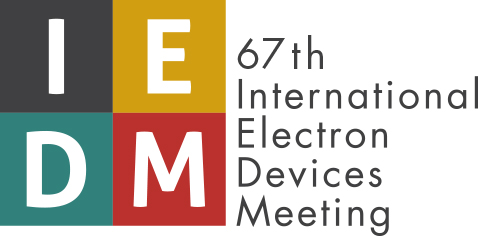
IEDM 2021 will feature special Focus Sessions on the following topics:
- Stacking of Devices, Circuits, Chips: Design, Fabrication and Metrology Challenges and Opportunities
- STCO for Memory-Centric Computing and 3D Integration
- Device Technology for Quantum Computing
- Topological Materials, Devices and Systems
- Technologies for AR/VR and Intelligent Sensors
SAN FRANCISCO, CA (June 4, 2021) – Under the theme “Devices for a New Era of Electronics: From 2D Materials to 3D Architectures,” the 67th annual IEEE International Electron Devices Meeting (IEDM) has issued a Call for Papers seeking the world’s best original work in all areas of microelectronics research and development.
The 2021 IEDM is being planned as an in-person conference December 11–15, 2021 at the Hilton San Francisco Union Square hotel, with on-demand access after the event for those who are unable to travel due to COVID-19 restrictions.
The paper submission deadline is Friday, July 23, 2021. Authors are asked to submit four-page camera-ready papers. Accepted papers will be published as-is in the proceedings. A few late-news papers also will be accepted, covering only the most recent and noteworthy developments. The late-news submission deadline is August 30, 2021.
The IEDM is the premier forum for technological breakthroughs in semiconductor and related device technology, manufacturing, design, physics and modeling. Each year, the world’s leading technologists gather to participate in a technical program of more than 220 presentations, plus panels, focus sessions, tutorials, Short Courses, supplier exhibits, IEEE/EDS award presentations and other events highlighting the industry’s best work.
“IEDM is currently being planned as an in-person event in San Francisco in December with on-demand access to content available after the event, although meeting plans are subject to change to stay in compliance with COVID-19 guidelines,” said Meng-Fan (Marvin) Chang, IEDM 2021 Publicity Chair and IEEE Fellow, Distinguished Professor of Electrical Engineering at National Tsing Hua University, and Director of Corporate Research at TSMC. “Should an in-person meeting not be feasible, IEDM will go fully virtual. Additional details will be made available later this year.”
“Our theme this year was chosen to emphasize the many changes sweeping across the electronics industry and the diverse technologies that are enabling them,” said Srabanti Chowdhury, IEDM 2021 Publicity Vice Chair and Associate Professor of Electrical Engineering at Stanford University. “IEDM 2021 will continue its long tradition of having a rich technical program full of relevant, state-of-the-art results, and the conference will give attendees the opportunity to interact with colleagues from academia and industry around the world.”
IEDM 2021 encourages submissions in all areas, with special emphasis on:
- Neuromorphic computing/AI
- Quantum computing devices
- Devices for RF, 5G, THz and mmWave applications
- Advanced memory technologies
- Technologies for advanced logic nodes
- Non-charge-based devices and systems
- Advanced power devices, modules and systems
- Sensors, MEMS and bioelectronics
- Package-device level interactions
- Electron device simulation and modeling
- Robustness/security of electronic circuits and systems
- Optoelectronics, displays and imaging systems
The IEDM 2021 technical subcommittees are as follows:
- Advanced Logic Technology (ALT)
- Emerging Device and Compute Technology (EDT)
- Memory Technology (MT)
- Microwave, Millimeter Wave and Analog Technology (MAT)
- Modeling and Simulation (MS)
- Optoelectronics, Displays and Imaging Systems (ODI)
- Power Devices and Systems (PDS)
- Reliability of Systems and Devices (RSD)
- Sensors, MEMS and Bioelectronics (SMB)
Further information
For more information, visit the IEDM 2021 home page at www.ieee-iedm.org.






